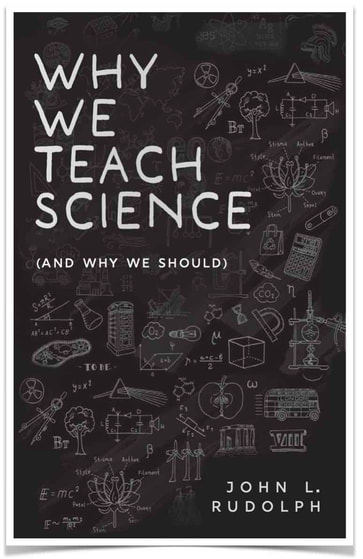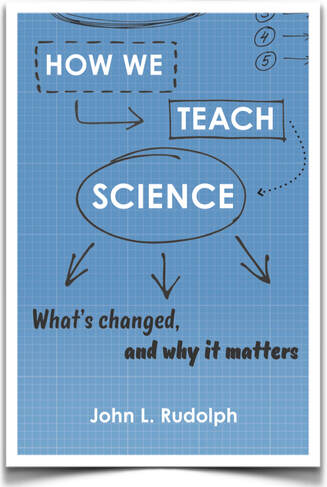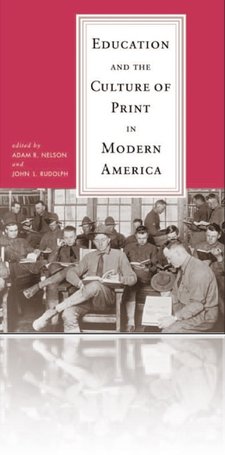|
NEW BOOK!
Why We Teach Science (and Why We Should) Oxford University Press, 2023 Amazon.com • Google Books • Oxford University Press Few people question the importance of science education in American schooling. It’s the key, after all, to economic growth, develops the ability to reason more effectively, and enables us to solve everyday problems. Good science teaching results in all these benefits and more—or so we think. But what if all this is simply wrong? What if the benefits we assume science education produces turn out to be an illusion, nothing more than wishful thinking?
In Why We Teach Science (and Why We Should), I examine the reasons we’ve long given for teaching science and assess how they hold up to what we know about what students really learn in science classrooms and what research tells us about how people actually interact with science in their daily lives. The results will surprise you. Instead of more and more rigorous traditional science education to fill the STEM pipeline, I challenge us to think outside the box of traditional instruction and make the case for an expansive science education aimed instead at rebuilding trust between science and the public—something we desperately need in our current era of impending natural challenges and science denial. REVIEWS
"John Rudolph's passionate manifesto Why We Teach Science (and Why We Should) aims to help readers reconsider the purpose of science education...."
— Jonathan Wai, Science "Rudolph lays out a compelling argument for the misalignment between the stated aims of science education, current science teaching practice, and what society urgently needs general science education to accomplish. " — Monica Sircar, Science Education "In Why We Teach Science, Rudolph paves the way for a new approach to teaching science, one that meets the needs of a science literate society." — Gale M. Sinatra, University of Southern California, Co-Author of Science Denial: Why It Happens and What to Do About It "A provocative and compelling interrogation of the discrepancy between the professed aims of American science education and the way in which it is actually conducted." — Glenn Branch, Deputy Director, National Center for Science Education "An essential read for anybody with any interest in what goes on in science education in our schools." — Jonathan Osborne, Graduate School of Education, Stanford University "A timely book by one of the country's best and most interesting thinkers about the history and current practice of science." — Ethan Hutt, University of North Carolina "The topic is timely; the pandemic and climate change have increased attention to science education, and Rudolph writes thoughtfully." — Andy Zucker, The Concord Consortium (Retired) |
" A brilliant book, providing a clear argument about why we need to reconceptualize science teaching in schools. This is a must-read for any science teacher and science educator!" — Kostas Kampourakis, University of Geneva "As someone immersed in the education of future science teachers as well as in research in science education and science communication, I found [Rudolph's] vision strongly appealing....This book offers a welcome opening for an important discussion" — Mairéad Hurley, SciComm Book Reviews "Rudolph pushes beyond the clichés to offer a unique, clear-eyed prescription for the kind of science education we really need." — Adam Laats, Author of Fundamentalist U and Creationism USA "In a thoroughly researched yet accessible style, Rudolph provides an overview of the evolution of the why and how of formal science education from the late 1800s to the present." — E. G. Harrington, Choice "Beautifully written, Why We Teach Science reflects on American's distressing lack of understanding of how science creates reliable knowledge and correctly challenges our long-standing focus on teaching science facts." — Bruce Alberts, Chancellor's Leadership Chair in Biochemistry and Biophysics for Science and Education, University of California, San Francisco "Why We Teach Science provides a lucid and comprehensive framework for thinking about science education, outlining a practical philosophy while also persuasively arguing that some goals are more worth achieving than others." — Andrew Shtulman, Professor of Psychology, Occidental College, author of Scienceblind "There is a great deal to admire in this book and the desired audience is not restricted to academics or educators. There is potential for this work to stir conversation and perhaps shape policy. Rudolph gives voice to countless grumbling conversations science education professors have." — John Settlage, University of Connecticut |
|
How We Teach Science: What's Changed, and Why It Matters (Cambridge, MA: Harvard University Press, 2019)
Amazon.com • Google Books • Harvard University Press "In this captivating narrative spanning more than two centuries, Rudolph shows how thinking about and teaching science have been radically transformed by changes in agenda, pedagogy, political and economic pressures, and the direct involvement of the scientific community."
— Ayelet Baram-Tsabari, Public Understanding of Science "How We Teach Science: What's Changed, and Why it Matters warrants careful reading by anyone committed to rejuvenating science teaching or conserving long‐held democratic values. Nowhere else is there a better portrait of how science teaching in the United States has, for 150 years, progressed in pursuit of achieving social value..." — Kip Ault, Science Education "...offers a detailed historical account of how science was first introduced into US classrooms and taught over the past century. ...[An] excellent description of early science instruction...especially relevant today." — Jennifer Schnellmann, Times Higher Education "Rudolph is...laser focused on the 'how' of the science classroom—how its practice varies across time, how its meaning is debated by reformers, and how its role in education shifts as schools themselves change. And for that discussion there is no better guide." — Christopher J. Phillips, Science A "well researched, informative book.... Anyone interested in science education and public policy should find much of value in How We Teach Science. No program for reshaping science teaching should be attempted without a solid knowledge of what has gone before. For that knowledge, you are unlikely to find a better source than Rudolph's book." — Patrick Lufkin, Technical Communication "A thorough history of science education in the United States..... Plenty of introspection on how I learned science, started teaching it, and how I teach it now. Recommended for any science teacher!" — @gosciencego "Rudolph reminds the reader that how science is taught has important social consequences. After all, what happens in the science classrooms will determine how future citizens will relate to science. ...an engaging narrative" — Maria Kolovou, Science & Education "In ten succinct, thematic chapters, [Rudolph] covers the history and societal goals of teaching science in the US and, in the process, delves into why science is taught—particularly to secondary students—the way it is today.... This is an invaluable resource for any library serving science education programs." — Rebecca Hedreen, Choice "...clearly demonstrates the importance of continued appraisal for science education. Rudolph asks us to reflect on why we, as a society, teach science and how we would hope to shape the relationship between science and the public." — Anthony Dellureficio, Quarterly Review of Biology "...a great resource for science educators and administrators in K-12 and higher education institutions endeavoring to improve science education in their domains." — Brenda Brand, Teachers College Record "A thought provoking dive into the history of science teaching....It turns out that today's debates over pedagogy are very old." — Jeff Mahr, Goodreads |
"Rudolph points a new way forward, drawing on the past to remake science education in the present….The greatest gift of this fine book may be its ability to inspire historians of science to imagine a role… in rethinking science curricula at the local, state, or even national level."
— Henry Cowles, Isis "...an engaging study....[One that helps us] better understand changes in Western education and the cultural history of science during the twentieth century." — Daniel Lövheim, Nordic Journal of Educational History "Rudolph...masterfully combines his knowledge of the reality of the classroom with the critical analytical gaze that the perspective of time provides." — Investigación y Ciencia "I urge policymakers and curriculum developers who are all looking for the next big innovation in science education to grapple with the historical account Rudolph provides as they consider their aims, means, and possible pitfalls in light of previous science education reform efforts." — Melissa Braaten, History of Education Quarterly "Scientific research has changed a great deal over the past century, but the ways that students have learned about science have changed even more dramatically. In this engaging and wide-ranging study, historian John Rudolph traces enormous pedagogical shifts, the aspirations behind them, and why they matter for scientists and citizens today.” ― David Kaiser, Massachusetts Institute of Technology “Why should we teach science? And how should we teach it? John Rudolph provides our first thorough history of the many ways that American educators have imagined―and instructed―science over the past century. At a moment when ‘STEM’ fields have become almost a fetish in American culture and education, I hope we can pause long enough to ask ourselves why. Nobody will be able to frame a good answer without first consulting this masterful book.” ― Jonathan Zimmerman, University of Pennsylvania “Rudolph delivers an insightful historical examination of the oscillating institutional goals for science education, highlighting social tensions surrounding teaching the natural sciences during the twentieth century.” — Richard Duschl, Southern Methodist University |
|
Scientists in the Classroom: The Cold War Reconstruction of American Science Education
(New York: Palgrave, 2002) Amazon.com • Google Books • Reviews In response to Soviet advances in science and engineering education, the country’s top scientists in 1956 launched an unprecedented program to reform pre-college science education in the US. Drawing on a wide range of archival material, Rudolph traces the origins of two of the leading projects in this movement in high school physics and biology. He describes how the scientists directing these projects drew on their wartime experiences in weapons development and defense consultation to guide their foray into the field of education and he reveals how the broader social and political conditions of the 1950s Cold War America fundamentally shaped the nature of the course materials they eventually produced.
|
|
Education and the Culture of Print in Modern America
(Madison: University of Wisconsin Press, 2010) Edited by Adam R. Nelson and John L. Rudolph Amazon.com • Google Books Vividly revealing the multiple layers on which print has been produced, consumed, regulated, and contested for the purpose of education since the mid-nineteenth century, the historical case studies in Education and the Culture of Print in Modern America deploy a view of education that extends far beyond the confines of traditional classrooms. The nine essays examine “how print educates” in settings as diverse as depression-era work camps, religious training, and broadcast television—all the while revealing the enduring tensions that exist among the controlling interests of print producers and consumers. This volume exposes what counts as education in American society and the many contexts in which education and print intersect.
|




